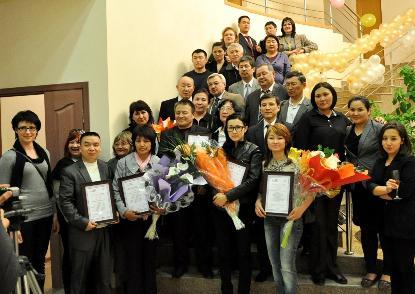
Participants in last year’s economic journalism training program.
From Astana to Tashkent, approximately 80 Central Asian media and business representatives will gather in Bishkek on October 11th for a two-day conference aimed at strengthening reporting on economic and business-related issues. Presenters will include experts from Belarus, Kazakhstan, Georgia, Russia, and Ukraine, who will offer lessons learned and best practices to develop the field of economic journalism and facilitate effective cooperation and information exchange between media and business.
The topics are timely and relevant, given Freedom House’s 2012 Freedom in the World Report which ranks four of the five Central Asian states among the least free countries in the world, with only Kyrgyzstan improving its ranking from last year. Even after more than twenty years of post-Soviet independence, the region still faces major challenges to its transition to a market-based democracy.
The media environment has been especially difficult to reform; Turkmenistan and Uzbekistan rank 157 and 177 respectively out of 179 countries on the Reporters without Borders 2011-12 Index of Press Freedom. Kazakhstan’s government recently enforced greater censoring of state media reporting on emergencies in the country. Independent, objective information is hard to come by in Turkmenistan and Tajikistan, and reporting on economic issues is particularly weak.
Kyrgyzstan, on the other hand, has made incremental but significant steps in developing the region’s first parliamentary government. Also, with the most open media environment in Central Asia, Bishkek provides a safe haven for journalists who otherwise might feel threatened in their own countries. In that regard, the CIPE/NED-funded conference provides opportunities for journalists working in difficult circumstances to build a support network and establish contacts in other countries.
Since 2009, CIPE’s partners, the Kyrgyz Stock Exchange Press Club (KSEPC) and the Development Policy Institute (DPI), have educated more than 170 journalists to improve economic and financial reporting in the region. This year DPI, a prominent public policy think tank based in Bishkek, has taken the lead on organizing the conference. With a competent and knowledgeable staff of experts, DPI works to improve local economic development by strengthening governance, promoting transparency and accountability, and facilitating dialog between the public and government, especially on economic issues (www.dpi.kg/en/ ). CIPE program staff in Washington provides guidance, contacts, publications and organizational support to DPI during the conference planning process. In addition, CIPE’s Washington and Moscow-based staff will attend this year’s conference to present on the role of the business community as a source of information and analysis for mass media.
In addition to Kyrgyzstan, similar CIPE-sponsored economic journalism programs have taken place in other countries, including Georgia and Serbia. CIPE also developed a handbook for economic journalists in Pakistan. As a result of the programs and publications, CIPE staff and partners have noted improved reporting and analysis on economics and business-related issues. The number of such articles and reports in the Kyrgyz media, for example, has doubled in the past three years.
Since many media outlets rely on the business community for facts, research and analysis on economic indicators, trade relations and the business climate, such a conference fosters information exchange between the two communities, who then work hand-in-hand to inform the public of issues that have profound impact not only on a state level but on the lives of ordinary citizens. Whether in Ashgabat or Dushanbe, the old adage still holds true: knowledge is power, and a well-informed citizenry that is empowered and equipped with objective information, key facts and comprehensive analysis can more effectively advocate for democratic change.

